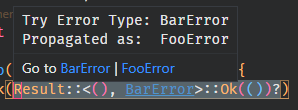FragmentKind played two roles:
* entry point to the parser
* syntactic category of a macro call
These are different use-cases, and warrant different types. For example,
macro can't expand to visibility, but we have such fragment today.
This PR introduces `ExpandsTo` enum to separate this two use-cases.
I suspect we might further split `FragmentKind` into `$x:specifier` enum
specific to MBE, and a general parser entry point, but that's for
another PR!
10146: fix: use placeholder as default type in `Generate function` and `Extract into function`. r=matklad a=iDawer
Closes#10123
Co-authored-by: Dawer <7803845+iDawer@users.noreply.github.com>
10139: Fix replacing for loops over ranges with for_each. r=yotamofek a=yotamofek
Previously, the assist would turn this:
```rust
for x in 0..92 {
...
}
```
into the syntactically incorrect code below:
```rust
0..92.for_each(|x| ...)
```
This fixes the assist by parenthesizing range expressions.
Co-authored-by: Yotam Ofek <yotam.ofek@gmail.com>
9954: feat: Show try operator propogated types on ranged hover r=matklad a=Veykril
Basically this just shows the type of the inner expression of the `?` expression as well as the type of the expression that the `?` returns from:

Unless both of these types are `core::result::Result` in which case we show the error types only.

If both types are `core::option::Option` with different type params we do not show this special hover either as it would be pointless(instead fallback to default type hover)
Very much open to changes to the hover text here(I suppose we also want to show the actual type of the `?` expression, that is its output type?).
Fixes#9931
Co-authored-by: Lukas Wirth <lukastw97@gmail.com>
When dealing with proc macros, there are two very different kinds of
errors:
* first, usual errors of "proc macro panicked on this particular input"
* second, the proc macro server might day if the user, eg, kills it
First kind of errors are expected and are a normal output, while the
second kind are genuine IO-errors.
For this reason, we use a curious nested result here: `Result<Result<T,
E1>, E2>` pattern, which is 100% inspired by http://sled.rs/errors.html
10095: internal: Augment panic context when resolving path r=jonas-schievink a=jonas-schievink
Should help with debugging https://github.com/rust-analyzer/rust-analyzer/issues/10084 and similar issues.
Might have a perf impact since the string is created on every function call.
Co-authored-by: Jonas Schievink <jonasschievink@gmail.com>
10097: fix: Allow inherent impls for arrays r=jonas-schievink a=jonas-schievink
Part of https://github.com/rust-analyzer/rust-analyzer/issues/9992 (method resolution of these methods still does not work)
bors r+
Co-authored-by: Jonas Schievink <jonasschievink@gmail.com>
10091: fix: fix "disjunction in conjunction" panic r=matklad a=jonas-schievink
Fixes https://github.com/rust-analyzer/rust-analyzer/issues/10073
The DNF construction code created expressions that were combined in a way that made us "forget" to make their contents valid DNF again. This PR fixes that by flattening nested `any(any())` and `all(all())` predicates. There was also a typo that led to a redundant call to `make_nnf` instead of the correct recursive call to `make_dnf` (but this didn't seem to break/fix anything).
This also adds some light property testing, though I'm not really sure this is the best way to do it.
Co-authored-by: Jonas Schievink <jonasschievink@gmail.com>